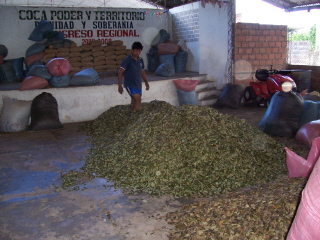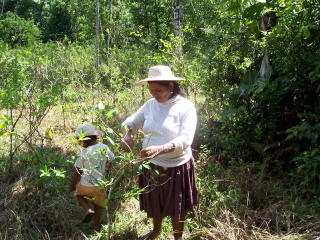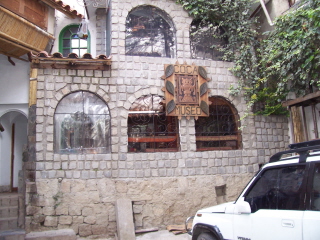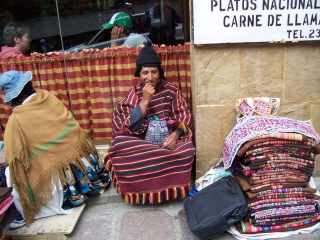A confrontation is brewing over Bolivian President Evo Morales' effort to rationalize coca production in his country and expand markets for coca-based products. After decades of fruitless efforts to wipe out the coca crop in Bolivia -- the "zero coca" policy embraced by the United States and shoved down the throat of successive Bolivian governments -- Morales, a former coca growers' union leader, has crafted policies that allow for the increased cultivation of coca from the 30,000 acres allowed under current Bolivian law to 50,000 acres. Now, the Morales government is also pushing for expanded legal markets for coca products and, in a joint venture with the Venezuelan government, is preparing to begin coca product exports to that country.

"The situation in Bolivia, which for many years has not been in conformity with that State's obligations under the international drug control treaties, continues to be a matter of particular concern to the Board," the report reads. "Bolivia is a major producer of coca leaf, and national legislation allows the cultivation of coca bush and the consumption of coca leaf for non-medical purposes, which are not in line with the provisions of the 1961 Convention."
The INCB was particularly concerned that Bolivia "has indicated its intention to review existing national drug control legislation, with a view to using coca leaf for a wide range of products, some of which might be exported." That, too, would not be in line with the INCB's interpretation of the Convention.
The language of the INCB report is a clear shot over the bow aimed at the Morales government's expressed policy of "coca, si; cocaine, no" and its efforts to expand the use of the coca leaf for medicinal and nutritional products. Worse yet, in INCB's view, Bolivia could set a bad example for other coca producing countries: "The Board is also concerned that policy developments in Bolivia could have repercussions in other countries in South America," the report fretted.
The United States has also expressed concern about Bolivian coca policy under Morales, as well as concerns about Morales' ties with Venezuelan leader Hugo Chavez, whose government earlier this month finalized an agreement with Bolivia to finance the construction of coca processing plants in Bolivia and to import Bolivian coca products to Venezuela. So far this year, the US government has limited its expressions of concern to worries about the "anti-democratic" natures of the two left-leaning South American leaders, but the State Department's annual review of other countries' compliance with US anti-drug policies is due later this month. A key question is whether Morales' policies will lead the US to "decertify" Bolivia as being in compliance with those objectives.

Clearly, there is no international consensus right now on coca, and if the Bolivian officials and analysts Drug War Chronicle spoke with this week are right, neither is there any indication the Bolivian government is about to bow to drug warriors in Washington and Vienna.
Industrialization of coca processing and expanding legal markets are the correct course of action, said Bolivian Deputy (congressman) Asterio Romero Wednesday. A member of Morales' Movement Toward Socialism (MAS) Party, Romero strongly supports the "coca, si; cocaine, no" policy. "First, I want to say that I am from the Chapare, I was a coca grower leader. It was always 'coca zero,' but there will never be zero coca," he told the Chronicle. "We fought for many years, we suffered many dead and imprisoned because coca is a source of economic subsistence for us. We will never allow other governments to impose 'coca zero' on us. We are a sovereign nation; it is a matter of Bolivian dignity," he said.
"While, yes, we fight against the drug traffic -- and we are doing quite well; seizures of cocaine and precursor chemicals are up -- we also have to decriminalize coca growing, and industrialization is the way," Romero argued. "We have to revalorize the coca, we have to find more markets for coca. There are friendly countries that help us, like Venezuela, and we thank them for that."
"With its opposition to the coca leaf, the INCB merely foments the drug traffic," said Silvia Rivera, founder of the Bolivian group Coca y Soberania (Coca and Sovereignty), professor emeritus of sociology at the University of La Paz, and advisor to Romero. "Every leaf that goes to good, healthy uses is a leaf that doesn't go to the traffickers," she told the Chronicle. "That's the best way to fight against the drug traffickers. Those bureaucrats at the UN simply do not understand; they think coca is a drug."

In fact, rather than retreating in the face of criticism from the INCB and the US, the Morales government appears determined to push the envelope with its agreement to supply coca products to Venezuela. Bolivia is also making noises about going to the root of the problem by mounting an effort to amend the Single Convention to remove coca from its list of illicit drugs.
"This is a way for Chavez to push the limits and see what the boundaries are," said Kathryn Ledebur of the Cochabamba-based Andean Information Network, which has monitored the Bolivian coca economy and efforts to repress it for years. "Who is going to stop him? There are already substantial coca leaf exports to northern Argentina, and nobody says anything about that. Still, if this helps sharpen the focus on changing the Single Convention, that's a good thing -- it needs to be amended."
Ledebur doubted that the Morales government would make a concerted effort to amend the Single Convention in Vienna next year. "Let's just say that his domestic coca policy is more advanced than his international one," she said. "I see little chance of anything getting done unless there is some sort of concerted lobbying effort with Peru, and I don't see Peruvian President Garcia as someone who is willing to actively buck the US."
Such a move would require a concerted effort by coca producing countries, said Romero, and he didn't see that happening just yet. "It is the job of the Bolivian government to change the Vienna Convention," he said, "but it is also the job of Colombia and Peru to join us at the UN. While we here in Bolivia have with Evo a government with popular support to push this, in Peru and Colombia, the governments are neo-liberal and pro-imperialist and they will not join us. But we are anti-neoliberal and we are going to maintain this position. Still, we are willing to talk government to government and man to man about this."

With Bolivia already facing off against the INCB, the next measure of the Morales government's coca policies will be the US certification decision, which should come by the middle of March. But given the current conjuncture in hemispheric affairs, with a rising tide of left-leaning governments and the US, obsessed as it is with affairs in the Middle East, losing influence in the region, the US may well step back from attempting to isolate and punish Bolivia via the certification process.
"The US still cannot step out of its anti-drug framework of using the military and forced eradication," said Ledebur, "but there is no agreement within the Bush administration about what to about certification. If it decertifies Bolivia, it loses what little leverage it has left. Bolivia now has other sources of assistance, and not just Chavez; it no longer has to blindly obey US dictates. If the US chooses to decertify now, what does it do next year?" she asked.
This is getting very interesting. The Morales government's "coca, si; cocaine no" policy is anathema to both the US and the INCB, but there appears to be little either can do to stop it, and chances are the Bolivian challenge will eventually aim directly at the 1961 Single Convention, perhaps knocking the first hole in what is the legal backbone of the global drug prohibition regime. Stay tuned.
This work by StoptheDrugWar.org is licensed under Creative Commons Attribution-ShareAlike 4.0 International
Comments
Bolivia should challenge US criminal mercantilism
Has EVo Morales considered suing the US under any free trade provisions?
Or the fact that Coca is safer then Coffee and infinitely safer then Tobacco?
What about a law suit against the US government for mass murder, given that Tobacco takes 40 million lives annually, Coca takes 0, and that the US largely went after Coca in the early 1900s as a "tobacco habit cure"?
it's the economy, stupid
if the united states really wants to reduce coca production in bolivia, it should be helping lift the bolivian farmers out of poverty, by using the $ it spends on its military presence on infrastructure (to get other crops to market), microlending or some kind of sustainable development program. bolivia is trying to do what is best for its own citizens - and good for them! i'm glad they're standing up to the US. it is disrespectful for the US to decree that coca is an unacceptable drug - its use dates back 100s of years and it is part of the native culture, just like alcohol use is part of our culture.
Coca si, Cocaine no.
Of course the war on drugs is stupid. Treat drug abuse the way that we treat alcohol abuse.
US Arrogrance
It's pretty damn arrogant of the US to dictate to other cultures what is acceptable and what is not. The entire world should not be bullied into copying the US culture. It would be great if Morales did present the Bush administration with a lawsuit.
It's past time the so-called Drug War was exposed for the failure it is. And the Bush administration and past US policy should be exposed for the bullying nonsense it is as well.
EVO and Coca
You all should watch this online piece about Bolivia. Pretty interesting. VBS.tv sent TraceCrutchfield to interview Evo Morales about coca and the results are quite whimsical. If the link doesnt work just go to VBS.tv and then Bolivian
http://www.vbs.tv/shows/index.php?show=Bolivian%20Marching%20Powder
Coca-cola
Coca-Cola corporation imports 100's of tons of coca leaves into US for use in coca-cola. Why was this not mentioned in this article?
Coca-ine Legalization/Domestication
Drastic measures as in legalizationa/domestication.
Domestication means making drugs as cocaine cheaply available in low glycemic forms (slow absorbing) to avoid the rapid adsorption of cocaine that promotes toxic-mania.
Alas the BS is sustained by the unethical who push adulterated/misbranded tobacco and essentially needless "rehab" programing.
Coca
For many of Bolivia's native peoples coca is a traditional and even spiritual plant. They have been growing it for thousands of years. It is part of their culture and many of them rely on coca for their only source of income. The United States can't tell them to stop now, due to United States own internal drug problems. Espeically when growing coca for its leaves which is what the majority of growers grow it for is harmless.
its alive!!
The thread is ALIVE!!!
In reply to its alive!! by Anonymous911 (not verified)
thank you
Thank you.
David Borden, Executive Director
StoptheDrugWar.org: the Drug Reform Coordination Network
Washington, DC
http://stopthedrugwar.org
Add new comment